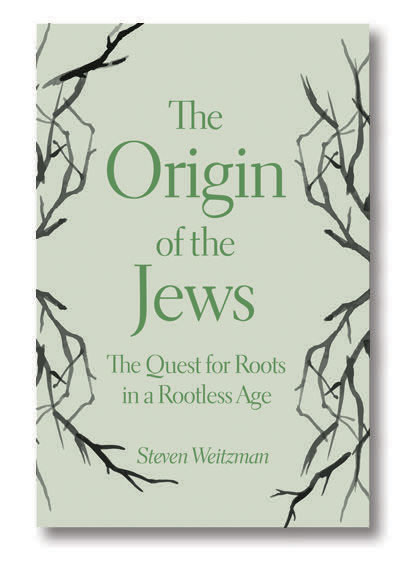 Is Jerry Seinfeld a descendant of King David?
Is Jerry Seinfeld a descendant of King David?
The question is no joke. Of all the issues that perplex the Jewish people and the wider world, none is so troubling is the primal one — what, after all, links us to the people, the land and the faith of distant antiquity as described in the Bible?
An answer is proposed in “The Origin of the Jews: The Quest for Roots in a Rootless Age” by Steven Weitzman (Princeton University Press), the Abraham M. Ellis Professor of Hebrew and Semitic Languages and Literatures at the University of Pennsylvania. He has studied and mastered the scholarship of Jewish origins, and he seeks to explain exactly what “connects all Jews into a single people, religion, or community; the very beginning of their collective story.”
The ancient scriptures, the author points out, only complicate the question: “[T]here is more to the story of how the Jews came to be than we can glimpse in the Bible,” he writes. Even the word “Jew,” which derives from the Hebrew word for the tribe of Judah (Yehud), may be misleading: “Are Jews today, in some collective sense, the same people as the ancient Judeans,” he muses, “or are they fundamentally different, transformed by the passage of time, or by some intervening change into another people?”
Weitzman explains the various theories that suggest a discontinuity between ancient and modern Jews. Freud imagined that the prophet and lawgiver Moses, the founder of what we call Judaism, actually was an Egyptian. Some scholars argue that Judaism as we know it today actually began only after the end of the Babylonian Exile or the destruction of the Second Temple in Jerusalem. Famously, and rather scandalously, Arthur Koestler’s “The Thirteenth Tribe” argued that the Jews of Eastern Europe actually are descendants of the medieval Khazars, who converted to Judaism in the medieval era. Even more recently, an Israeli historian named Shlomo Sand has argued that “much of what people think they know about the Jewish people goes back to historians in the nineteenth century and the first part of the twentieth, and that their representation of the Jews was a fiction that they contrived.”
Each contending theory carries its own subtext, some of which are overtly hostile to Judaism, or Zionism, or both.
DNA testing and the science of genomics seem to offer the promise of a definitive answer to the question of Jewish origins, but Weitzman reminds us that it can come uncomfortably close to some of the racist assumptions of Jew-haters ranging from the Spanish Inquisition to Nazi Germany. Moreover, while DNA evidence has confirmed that many of the Kohanim — Jews identified as descendants of the ancient priesthood — appear to share a common ancestor, we do not know yet that their ancestry dates all the way back to biblical antiquity.
Even the cutting-edge tools of modern genetic testing, however, do not support the claims of Davidic descent that have been credited to various luminaries, from Rashi to Elie Wiesel to even Jerry Seinfeld. As it happens, Weitzman acknowledges the late David Einsiedler, co-founder of the Jewish Genealogical Society of Los Angles, for the proposition that “there is no complete, reliable and positive proof of claims of descent from David.”
Weitzman’s book is rooted in serious scholarship, but he also is attuned to the ways in which the yearning for identity has been used and abused. Thus, for example, he reminds us of the shameful phenomena of forged Holocaust memoirs and suggests that some prideful Jews are willing to engage in “a kind of ‘genetic astrology’ ” in order to validate their imagined connections to great figures of Jewish history and the Bible.
Weitzman is aware that the authenticity of the linkage between modern Jews and the ancient tribes of Israel has been used against the Jewish people, no less in the ancient world than in the debate over the legitimacy of Jewish sovereignty in Israel today. Indeed, he concedes that some readers may decide that the question itself is “too contentious to pose.”
But it also is true that the Jewish tradition of asking audacious questions starts with the Torah and must be honored as one of the core values of Judaism. For that reason alone, Weitzman’s courageous and illuminating book is essential reading for anyone who wonders or cares about what it really means to be a Jew.
JONATHAN KIRSCH, publishing attorney and author of “The Woman Who Laughed At God: The Untold History of the Jewish People,” is the book editor of the Jewish Journal.























 More news and opinions than at a Shabbat dinner, right in your inbox.
More news and opinions than at a Shabbat dinner, right in your inbox.